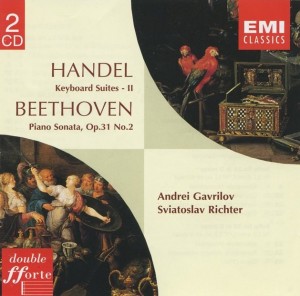It was CD chuckout time. The only things being kept were tracks you could listen to in a traffic jam. To begin with this meant Bach’s Partita No 2 in D minor, BWV 1004, played by Paul Galbraith on an 8-stringed guitar. Serenity itself. A musical cool for frayed nerves.
 Then Handel’s Keyboard Suites, not excepting the exercises he wrote for one of George II’s daughters, Princess Louisa. The princess was lucky to have Handel as her music master, and anyone stuck bumper to bumper will be grateful for the calmly executed fingerwork of Sviatoslav Richter as he makes his way through Handel’s “Keyboard Suite for Princess Louisa in G Minor, HWV 452, No. 1.” Or numbers 2 or 3 for that matter. And if you tire of these try the minuet in Keyboard Suite #3 in D Minor, HWV 436.
Then Handel’s Keyboard Suites, not excepting the exercises he wrote for one of George II’s daughters, Princess Louisa. The princess was lucky to have Handel as her music master, and anyone stuck bumper to bumper will be grateful for the calmly executed fingerwork of Sviatoslav Richter as he makes his way through Handel’s “Keyboard Suite for Princess Louisa in G Minor, HWV 452, No. 1.” Or numbers 2 or 3 for that matter. And if you tire of these try the minuet in Keyboard Suite #3 in D Minor, HWV 436.
In a historical sleeve note Robin Golding writes that much of Handel’s keyboard music was written for domestic use. A friend who lived near Handel in London named Mrs Delany (Mary Granville, later Pendarves) sent a letter to her sister describing a musical evening at her house in 1734 [orthography and emphasis in original]:
I must tell you of a little entertainment of music I had last week… Lord Shaftesbury begged of Mr Percival to bring Mr Coot, and being a profess’d friend of Mr Handel (who was also here) was admitted; I never was so well entertained at an opera!
Mr Handel was in the best humour in the world, and played lessons and accompanied Strada [one of the favourite singers at the opera] and all the ladies that sang from seven o’the clock till eleven.
I gave them tea and coffee, and about half an hour after nine had a salver brought in of chocolate, mulled wine and biscuits. Everybody was pleased and seemed pleased, Bunny [her brother] staid with me after the company was gone, eat a cold chick with me, and we chatted till one o’the clock.
Robin Golding adds that Handel enjoyed such society and would probably have played some of his keyboard suites, or “lessons” as they were called. Some of these had in fact been written as teaching material:
Handel never had many pupils in London but he taught the three princesses Anne, Caroline and Louisa, daughters of George II, and they were all three devoted to their master. He was paid 200 pounds a year for his labours, as well as receiving a pension from the King making the sum up to 600 pounds.
On a manuscript copy, in the Royal Music Library, of the first two suites from the Third Collection of Lessons, Handel wrote: “Lessons for Princess Louisa”. She was fifteen in 1739 when Handel is thought to have written the pieces and, to judge by the music, she must have been quite a capable player for her age.
Some things that you wouldn’t play in a car—and would be impossible to play in a traffic jam—are however also destined to be kept, among them Sir Georg Solti’s 1960s recording with the LSO of Bartok’s Concerto for Orchestra. Wonderful wild and thrilling music.

 An Australian writer living in Sydney, Roger Sandall is the author of The Culture Cult (2001), a study of romantic primitivism and its effects. His work has appeared in a number of places including Commentary, The American Interest, Encounter, The New Criterion, The American, Sight and Sound, Quadrant, Art International, The New Lugano Review, The Salisbury Review, Merkur, Mankind, Visual Anthropology, and Social Science and Modern Society.
An Australian writer living in Sydney, Roger Sandall is the author of The Culture Cult (2001), a study of romantic primitivism and its effects. His work has appeared in a number of places including Commentary, The American Interest, Encounter, The New Criterion, The American, Sight and Sound, Quadrant, Art International, The New Lugano Review, The Salisbury Review, Merkur, Mankind, Visual Anthropology, and Social Science and Modern Society.